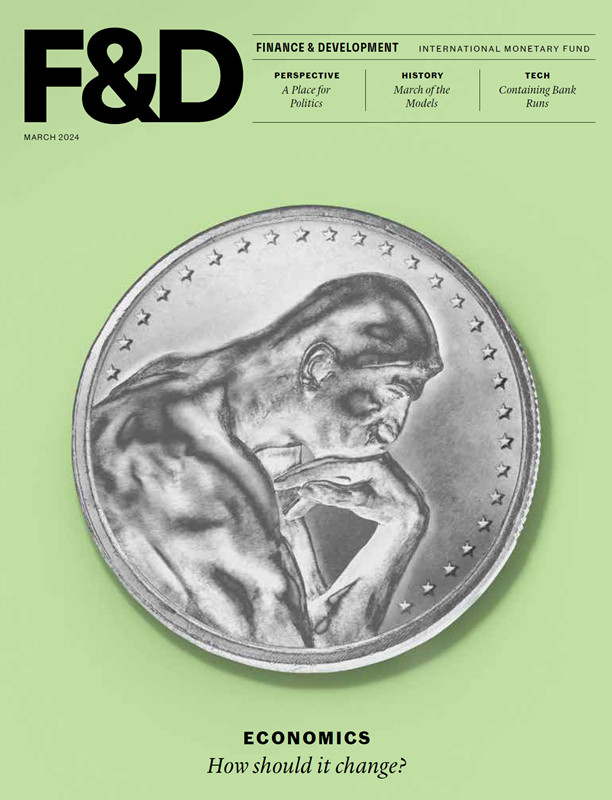Politics is often messy, but it’s how society puts a value on things economists can’t measure
Even as the United States took its place as the world’s preeminent economic power after World War II, manufacturing firms fled towns in the Northeast and Midwest, leaving behind rusting steel mills and scarred communities. Society as a whole became richer as new industries sprang up elsewhere, but many rust belt communities are still dealing with the consequences of deindustrialization.
The US postwar economic transformation is one example of how policies and trends that increase aggregate social welfare can have painful distributional effects: they beget winners and losers. This makes them controversial. Controversy is no reason to avoid an economic policy, especially if the policy makes society substantially better-off. Policymakers often struggle to persuade the public to accept economic policies that improve well-being. To make them more palatable to the public, policymakers must recognize that policies and trends take place in a broader social and political environment. It is vital that policies gain the acceptance of important social and political actors.
Economics is good at identifying policies that could raise aggregate social welfare. One such policy is free trade. Virtually all economists believe that most economies could be improved by removing barriers to trade. No sensible economist or policymaker pretends that this is costless: while consumers and exporters may benefit, firms and industries that have trouble competing with imports are likely to suffer.
There is a simple economic solution. If a social-welfare-improving policy creates losers, the benefits it generates for society can be used to compensate those harmed. The government can tax those advantaged by trade liberalization—exporters, consumers—to help those disadvantaged, autoworkers for instance. Since by definition the policy increases social welfare, spreading the gains will still leave society better-off, only in a more equitable fashion than if we simply left newly unemployed autoworkers to fend for themselves.
Compensation’s problems
Compensation may be simple and powerful in theory, but it’s not easy in practice. Those who gain from a new policy—such as consumers and exporters when trade is liberalized—are rarely enthusiastic about having some of their gains taxed away. Compensation can be costly and politically difficult, which is why it happens far less frequently than economists would recommend.
Compensation can be difficult for other, more complex, reasons. One is timing: in some cases the appropriate measure would be for one generation to compensate another. For instance, there might be a certain equity, as well as mutual benefit, in asking future generations to contribute to the society of 2024 if the latter bore the cost of tackling climate change—for example, to address jobs lost to the green transition. But how do we get “the future” to pay up? One way would be for the government to borrow and let the debt-service payments fall on future generations. Sensible as this may be in practice, it risks the prospect of debt burdens that are not sustainable. Indeed, it is hardly in a country’s long-term interest to tempt current legislatures to bankrupt governments of the future, and financial markets may not let them—they may be unwilling to fund debts they consider excessive.
Another problem with compensation is that it’s often unclear exactly who will be helped and harmed by a policy. There is almost always uncertainty about how a complex economy will react to change. Economists may have faith in their models, but workers and managers may be less confident in their predictions. The danger of subjecting constituents to unknown risks can make legislators wary of battling for one policy or another.
A related obstacle to compensation is lack of credibility. Governments can promise to make things right for those who may be harmed by, say, freer trade or climate policy. But, at least in democratic countries, governments change. Newly elected officials, often having attained office by criticizing their predecessors, are not always keen to maintain their predecessors’ policies. Many administrations don’t even keep their own promises, let alone those of others. In a world where both outcomes and government policies can vary, those who think they might be affected have plenty of reasons to be cautious.
The most serious reservations about compensation may be noneconomic. Economic analysis focuses on the purely material or pecuniary impact of policies and trends, and of eventual compensation. People, though, may be concerned about less clearly material impacts that are hard to put a price on.
For instance, trade liberalization has contributed to the decline of traditional manufacturing in the US industrial belt—as well as in the north of England, northern France, eastern Germany, and other formerly industrial areas. When the jobs go, there is clearly an economic cost, in lost jobs, wages, tax revenue, and general economic activity.
Distressed regions
But distressed regions may lose something just as real, though less tangible, as well-paying jobs. A small city or town whose factories close can enter a downward socioeconomic spiral: incomes decline, property values and property taxes plummet, local services suffer, and the community’s social fabric unravels. This was the prelude to an epidemic of “deaths of despair” by alcoholism, drug abuse, and suicide (Case and Deaton 2020). Even when the impact is not so acute, when Main Street goes dark, the quality of life—for everyone in town—suffers. The collapse of a stable economic base undermines the foundations of the community (Broz, Frieden, and Weymouth 2021).
A common remedy is to encourage those left without work to move to places where jobs are available. This can be difficult or impossible for economic reasons, since those wanting to move from depressed areas are often saddled with plummeting home values. Residents may be reluctant to move for nonpecuniary reasons, too. They may have family and extended family in the area, decades of friends and neighbors, and attachments to local traditions. Depressed or not, it’s what they know, and it’s home.
The deterioration of coal mining regions illustrates the problem. The coal industry has been declining for years because of both environmental concerns and technological change—and more recently, of course, climate policies. Its decline has devastated entire areas—and not just the coal miners (Blonz, Tran, and Troland 2023). Many coal mining communities were isolated, and few were economically diversified, so once the decline set in there was little to break their fall. One World Bank study found that of 222 Appalachian coal counties, only four had managed to remain “economically viable” (Lobao and others 2021). East and West coast city dwellers may be scarcely aware of them, yet millions of people lived in coal counties, often in tight-knit towns where families had lived for generations bound by social, cultural, and religious ties.
The cost of leaving your family’s historical community is not solely monetary—it means giving up all those personal ties. And there’s no point in asking people what it would take for them to leave: each person’s decision depends on the decisions of others. Why stay if everyone is leaving? Why leave if everyone is staying? And the future of the community may depend on whether its members stay together—and at least preserve the hope of forging a more promising future.
In this context, how can society weigh the consumer benefits of cheaper clothing or cars against the human costs of the collapse of cities and towns in Ohio, the Meuse Valley, or south Yorkshire? Some of these costs are certainly economic and might be suitable for monetary compensation. But some are noneconomic, with a value impossible to establish with any precision. How do you put a price on membership in a close-knit multigenerational community?
Politics as a measure
Society does, in fact, have a way to try to establish the relative importance of these difficult-to-measure values: politics. When we debate the merits of free trade versus local factories, or of coal and oil versus wind and sun, we are implicitly or explicitly discussing how heavily to weight the interests of consumers and producers, the harmed and the helped, current and future generations.
Most studies of trade politics, for example, show that elected officials are more likely to protect (with tariffs and other trade barriers) industries with low-wage workers than industries dominated by high-wage workers. There may be many reasons for this tendency; one reason is almost certainly that people have more sympathy for displaced low-wage workers. In another context, city dwellers who have never lived on a farm appear willing to pay more for their food in order to help sustain family farmers, largely out of a wistful attachment to and sympathy for the rural way of life.
Trade protection or farm subsidies may make political, if not economic, sense—and thus be entirely defensible. The political process weighs people’s values, including those that are hard to price. In this balance, caring deeply about something counts more than caring only a little—so it matters that consumers may care only a little about the price of toys, whereas the residents of a factory town may care a great deal about the cohesion of their community. In the political arena, intensely held views matter more than those that are held only lightly—and that is probably as it should be.
Politics is the mechanism by which societies make difficult choices among things that are often hard to compare. The choices are rarely perfect, and they are usually contentious. But this is how modern societies assess the value citizens place on their own values. It is in the political arena that people get to balance, say, the viability of a small town against the benefits to shoppers of cheaper clothing. Economic growth and progress matter a lot, but people care about other things too, and those other cares deserve consideration.
Oscar Wilde wrote of those who know the price of everything but the value of nothing. It would be fairer and more accurate—and more useful—to note that economists are able to put a price on many things, but not on everything of value. Democratic politics may not give us a universally accepted sense of the value of priceless things—such as community, culture, and family. But it can tell us something about how members of society feel about these things and how they weigh them against each other.
Podcast

Even optimal economic policies create winners and losers, and that’s where politics steps in. Trade liberalization is an example of a policy that can make a country better off as a whole, but what happens to workers who lose out to cheaper goods? Jeffry Frieden says while politics is often messy, it’s how society puts a value on things economists can’t measure.
Opinions expressed in articles and other materials are those of the authors; they do not necessarily reflect IMF policy.
References:
Blonz, Josh, Brigitte Roth Tran, and Erin E. Troland. 2023. “The Canary in the Coal Decline: Appalachian Household Finance and the Transition from Fossil Fuels.” NBER Working Paper 31072, National Bureau of Economic Research, Cambridge, MA.
Broz, J. Lawrence, Jeffry Frieden, and Stephen Weymouth. 2021. "Populism in Place: The Economic Geography of the Globalization Backlash" International Organization 75 (2): 464–94.
Case, Anne, and Angus Deaton. 2020. Deaths of Despair and the Future of Capitalism Princeton, NJ: Princeton University Press.
Lobao Linda, Mark Partridge, Oudom Hean, Paige Kelly, Seung-hun Chung, and Elizabeth Ruppert Bulmer. 2021. “Socioeconomic Transition in the Appalachia Coal Region: Some Factors of Success.” World Bank report, Washington, DC.









